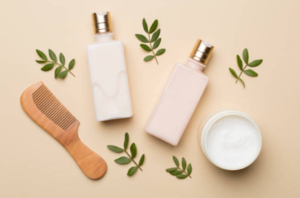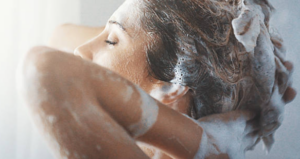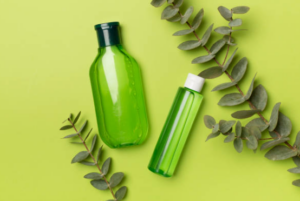Unveiling the Truth Behind the Sulfate Debate in Haircare

For many beauty enthusiasts, navigating the shampoo aisle can feel like stepping into a minefield. One of the most debated ingredients on the label? Sulfates. Often demonized as the culprit behind dry hair and irritated scalps, sulfates have been cast as the villain in the quest for healthy hair. But is this reputation entirely deserved? This informative guide dives into the science behind sulfates, explores the “sulfate-free” revolution, and empowers you to make informed choices for your unique haircare needs.
Unveiling the Chemistry: Demystifying Sulfates
Sulfates are a group of cleansing agents commonly found in shampoos. Their primary function is to create lather, the satisfying foam we associate with a clean scalp. Sodium Lauryl Sulfate (SLS) and Sodium Laureth Sulfate (SLES) are the most widely used sulfate players in the shampoo game. While they excel at removing dirt, oil buildup, and styling product residue, concerns have been raised about their potential to be harsh and stripping on the scalp and hair.
However, it’s important to understand that formulation plays a crucial role. Reputable brands carefully balance the cleansing power of sulfates with conditioning agents and other ingredients to minimize any potential harshness.
The “Sulfate-Free” Revolution
The rise of the “sulfate-free” movement has seen a surge in shampoos reformulated with gentler alternatives like coco-sulfates or betaines. These milder cleansers can be a good option for those with sensitive scalps or color-treated hair, as they may be less likely to cause irritation or color fading.
However, it’s important to remember that “sulfate-free” doesn’t necessarily equate to “better” for everyone. Sulfate-free shampoos often have a lower lathering effect, which can be a dealbreaker for some. Additionally, they might not be as effective at removing buildup from heavy styling products.

Unveiling the True Culprits of Hair Woes
While sulfates might be a convenient scapegoat for hair woes, the real culprits behind dryness, breakage, and irritation can often be:
- Over-washing: Stripping your hair of its natural oils too frequently can disrupt the scalp’s natural balance, leading to dryness and breakage. Aim to wash your hair 2-3 times per week, depending on your hair type and activity level.
- Heat Styling: Excessive heat styling without proper heat protectant can damage the hair’s structure, making it dry, brittle, and prone to breakage. Limit heat styling whenever possible, and always use a heat protectant spray before using hot tools.
- Chemical Processing: Bleaching, coloring, or relaxing treatments can weaken hair and make it more prone to damage. If you regularly undergo chemical processing, it’s crucial to choose gentle haircare products and incorporate deep conditioning treatments into your haircare routine.
When to Consider Sulfate-Free Shampoos
Here are some scenarios where opting for a sulfate-free shampoo might be beneficial:
- Sensitive Scalp: If you experience scalp irritation or dryness with traditional shampoos, a sulfate-free option could be more soothing and less likely to trigger irritation.
- Color-Treated Hair: Sulfates can sometimes accelerate color fading. Consider a sulfate-free formula to help prolong the vibrancy of your hair color.
- Dry or Damaged Hair: If your hair is already struggling with dryness or breakage, a gentler cleansing approach offered by sulfate-free shampoos might be helpful.

The Balancing Act: Weighing the Pros and Cons
There’s no one-size-fits-all answer in the sulfate debate. Both sulfate and sulfate-free shampoos have their pros and cons:
Sulfate Shampoos:
- Pros: Excellent at removing buildup, create a satisfying lather, often more affordable.
- Cons: Can be potentially harsh on sensitive scalps, might accelerate color fading.
Sulfate-Free Shampoos:
- Pros: Gentler on sensitive scalps, may help preserve color vibrancy.
- Cons: May not remove buildup as effectively, often don’t lather as much, can be pricier.
The key to navigating the debate lies in understanding your individual haircare needs and preferences. Consider your hair type, scalp sensitivity, styling habits, and desired level of lather when making your choice.
Frequently Asked Questions
Even with the information provided, some lingering questions about sulfates might remain. Here are some of the most frequently asked questions regarding sulfates in haircare:
- Are sulfate-free shampoos safe for all hair types?
Sulfate-free shampoos can be a good option for most hair types, especially those with sensitive scalps or color-treated hair. However, if you have fine or oily hair, a low-sulfate shampoo might be a better choice, as completely sulfate-free formulas might not be as effective at removing buildup.
- Do sulfate-free shampoos clean hair as well?
While sulfate-free shampoos might not create the same level of lather as traditional sulfate shampoos, they can still effectively cleanse the scalp and hair. The key lies in lathering the shampoo for a longer duration and ensuring a thorough rinse.
- Can I switch between sulfate and sulfate-free shampoos?
Absolutely! There’s no harm in using both sulfate and sulfate-free shampoos in your haircare routine. For example, you might choose to use a sulfate shampoo for a deep cleanse once a week, followed by sulfate-free shampoos for the rest of the week.
- What are some alternatives to sulfates?
Several gentler cleansing agents are used in sulfate-free shampoos, such as coco-sulfates, betaines, and glucoside derivatives. These alternatives can effectively cleanse the hair while being milder on the scalp.
- Should I prioritize lather when choosing a shampoo?
Lather doesn’t necessarily equate to a cleaner scalp. Sulfate-free shampoos can still cleanse effectively, even without a significant lather. Focus on how your scalp and hair feel after using the shampoo, rather than the amount of lather it produces.

Cultivating Healthy Hair Beyond the Label
The quest for healthy hair goes beyond simply choosing a sulfate-free or sulfate-containing shampoo. A holistic approach that incorporates gentle cleansing, proper conditioning, and healthy lifestyle habits is key.
- Invest in a Quality Conditioner: Regardless of whether you choose a sulfate or sulfate-free shampoo, a good quality conditioner is essential. Conditioning helps replenish moisture, detangle hair, and improve manageability.
- Embrace Deep Conditioning Treatments: Regularly incorporating deep conditioning treatments into your haircare routine is crucial, especially for dry, damaged, or color-treated hair. Deep conditioners provide a more intensive dose of moisture and nourishment.
- Maintain a Balanced Diet: What you eat can impact your hair health. Ensure your diet is rich in essential nutrients like vitamins A, C, E, and protein, which contribute to healthy hair growth and overall hair health.
- Manage Stress: Chronic stress can contribute to hair loss and other hair problems. Practice stress-management techniques like yoga, meditation, or spending time in nature to promote overall well-being, including hair health.
By adopting a comprehensive haircare routine that addresses your individual needs and prioritizes gentle cleansing, balanced ingredients, and healthy lifestyle habits, you can cultivate beautiful, healthy hair that thrives, regardless of the sulfate content on the shampoo label.




